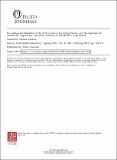Files in this item
Re-reading Ibn-Khaldun in the 21st century : traveling theory and the question of authority, legitimacy, and state violence in the modern Arab world
Item metadata
| dc.contributor.author | Abozaid, Ahmed | |
| dc.date.accessioned | 2021-05-10T13:30:17Z | |
| dc.date.available | 2021-05-10T13:30:17Z | |
| dc.date.issued | 2021-05-01 | |
| dc.identifier | 274094291 | |
| dc.identifier | 3a34aa53-e73d-4c3a-bdff-27d21b323f2e | |
| dc.identifier | 85112332074 | |
| dc.identifier | 000727875700005 | |
| dc.identifier.citation | Abozaid , A 2021 , ' Re-reading Ibn-Khaldun in the 21st century : traveling theory and the question of authority, legitimacy, and state violence in the modern Arab world ' , Arab Studies Quarterly , vol. 43 , no. 2 , pp. 146-171 . https://doi.org/10.13169/arabstudquar.43.2.0146 | en |
| dc.identifier.issn | 0271-3519 | |
| dc.identifier.uri | https://hdl.handle.net/10023/23143 | |
| dc.description.abstract | To illuminate the complicated relationship between the authorities and society in the contemporary Arab world, this paper draws on Ibn Khaldun's propositions. By applying Edward Said's notion of traveling theory, it traces, interrogates, and evaluates ways in which multiple readings of Ibn Khaldun's theory have been (re)formulated, transplanted, and circulated by other authors, and how these theories traveled from an earlier point to another time and place where they come into new prominence. Furthermore, it examines how three contemporary Arab thinkers (Abid Al-Jabri, Abdullah Laroui, and Nazih Ayubi) addressed and interpreted the heritage of Ibn Khaldun and his theory on state formation and authority constitutive in the Arab Islamic world (particularly the Sunni world). The paper concludes that, in comparison with Said's “traveling theory” intentions, the three modern Arabic readings of Ibn Khaldun's theory were not traveling as much as it was attempting to uproot, distort, suffocate, and even bury Ibn Khaldun's original theory, as well as obliterate and culturally appropriate the features of the original theory, and portray it as the opposite of progress and modernization, in favor of enhancing the dominance of Western epistemology. | |
| dc.format.extent | 999716 | |
| dc.language.iso | eng | |
| dc.relation.ispartof | Arab Studies Quarterly | en |
| dc.subject | Ibn Khaldun | en |
| dc.subject | Edward Said | en |
| dc.subject | Traveling theory | en |
| dc.subject | Decolonialization | en |
| dc.subject | Arab State | en |
| dc.subject | Authority | en |
| dc.subject | Legitimacy | en |
| dc.subject | State violence | en |
| dc.subject | JZ International relations | en |
| dc.subject | T-NDAS | en |
| dc.subject | SDG 16 - Peace, Justice and Strong Institutions | en |
| dc.subject | NIS | en |
| dc.subject.lcc | JZ | en |
| dc.title | Re-reading Ibn-Khaldun in the 21st century : traveling theory and the question of authority, legitimacy, and state violence in the modern Arab world | en |
| dc.type | Journal article | en |
| dc.contributor.institution | University of St Andrews. School of International Relations | en |
| dc.identifier.doi | 10.13169/arabstudquar.43.2.0146 | |
| dc.description.status | Peer reviewed | en |
This item appears in the following Collection(s)
Items in the St Andrews Research Repository are protected by copyright, with all rights reserved, unless otherwise indicated.

